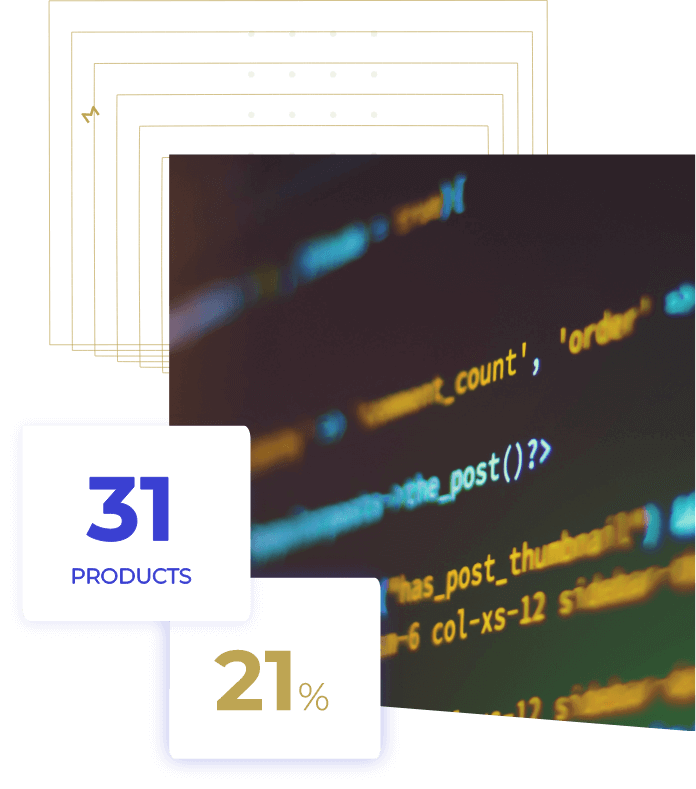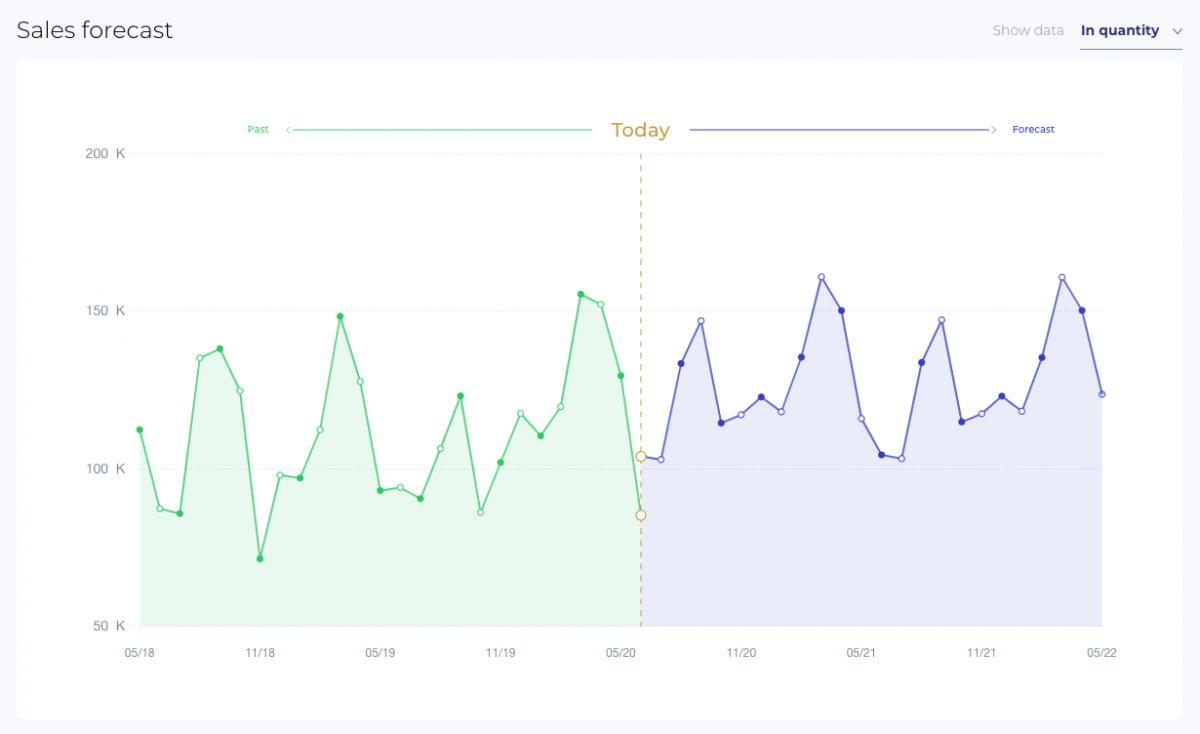Sales forecasting
and inventory optimization
Become a retail mastermind you always wanted to be.
Become a retail mastermind you always wanted to be.
A successful retail business is all about getting the numbers right, especially the scale of those numbers. Retail empires start small, usually driven by the owner’s passion for a certain field or interest. Let’s say you know everything there is to know about fly fishing. You’ve tried everything, every piece of equipment, so you know what’s best. You leverage this skill and know-how into your very first retail shop. You are in the best position to give good, professional advice to your customers. You know which manufacturers are for real, and which ones make shiny but useless pieces of equipment. So you start your business and quickly become popular among sport fishermen. The sky is the limit now. Or is it?
Growing a retail business isn’t as easy as it might seem. Suddenly you lose close contact with your customers, suddenly you have employees trying to cheat you. You find it harder and harder to maintain goods at all times; your suppliers just can’t keep up. And then there’s cash flow…
The nightmare just keeps getting worse as your business begins to grow. The margins get worse. The risks get more risky. And your weekends start to resemble your weekdays, if you even notice it’s the weekend. And that’s the first thing you should know about retail: It becomes overwhelming after only a few short months, impossible for the human mind to manage in any comprehensive way.
That’s why you need to build your retail business based on numbers and facts from day one. It’s good that you are passionate about your interest or field. Stay that way, but don’t expect your passion to drive your business results forever.
The good news is that everything can be measured in retail, and the larger your business gets, the better and more accurate measurements you can make. But there’s a catch! You have to know what to measure.
The negative effect of measuring everything is that you end up with a huge amount of information, which usually ends up in some meaningless (but attractive) dashboard. Business intelligence in the retail industry is all about getting to the right numbers, the ones that really make a difference. It’s about reacting in a timely manner to the data, and evaluating that data in real time. And although you may think you know all there is to know about your business, it might be useful to look at some factors other business owners keep an eye on:
Good business intelligence software for retail knows everything about your business weeks, even months, before it actually happens. Forecasting is essential for all planning, because generating numbers and data based only on past data doesn’t give business owners the benefit of making smart, data-driven decisions.
For example, Barcelona wins the Champions League, and you think to yourself, “They’re going to win it again next year.” Or, you watch Tesla stock rise for a week and think, “Looks like a winner, this is definitely going to continue, I’m gonna buy some Tesla stock.”
Clearly, Barca could win next year, and Tesla’s stock price may rise forever, but a lot can happen to change that. As a business owner, you can’t just hope or assume. You need business intelligence software to give you a certain probability that what you think might happen actually will. With a higher level of probability, you can make judgements and assumptions based on data. Then, you can sit back and watch your business grow steadily over time.
The main thing you need your business intelligence software to forecast is sales and future demand. You need to understand what’s coming your way to prepare. And yet forecasting is not enough, if your software can’t transform those forecasts into specific recommendations.
When business intelligence software just shows you data, and this information doesn’t translate to cost savings, your software is just wasting your time. Good software should be more than just numbers and graphs. It should give users direct and meaningful information, even tips for improvement.
These days, we see software talking more and more in sentences and less in numbers than in the past. This is a trend that started around five years ago. Business software is becoming leaner, with less information but more value, all throughout the business intelligence industry.
In retail, you want your software to deliver useful insights about your
It is these fields that have the largest potential for savings.
Your software should give you meaningful information that you can act on. The quality of the information the software delivers is directly correlated to the source data the algorithm receives. Keeping your system in the cloud just makes everything much easier for implementation. APIs are a standard part of today’s business software solutions. Connecting the dots throughout the whole chain of events has never been easier. Cloud computing is also beneficial for business intelligence, as it leaves an open window for any changes in the future. Your organization will likely onboard more solutions in the future, and your current ecosystem should always be prepared to evolve. Again and again. The cloud is a much better environment for this versatility.
Business intelligence software makes your entire organization function more efficiently. You become more profitable and better connected. Sure, a lot of software has the potential to make a difference, but only if you can connect all the valuable information it generates to the relevant people in the organization, or even outside.
Now, let’s say your business intelligence software sends you a notification indicating that you will soon run out of a specific item you have in your sales portfolio. This information should reach the person who is responsible for placing orders to suppliers. Normally, you would immediately forward this information to the relevant person. But what if you’re on a boat, or in a long meeting, or there’s simply no way for you to react immediately. You don’t get the information to the person who needs it, until it just might be too late.
Especially in retail you want business intelligence software that will allow those who need to know access to that information, whoever that may be, anyone you might think is important for the flow of your business. And yes, that includes external entities, like banks for example.
Trusting software is never easy. Yet technology has become a part of our everyday lives, and some bits of information created by machines are now taken for granted. Think of electric thermometers or Google Maps. Do you have to constantly check them for accuracy? No. You have faith in technology, and that faith has been proven again and again over time. It works, and you trust it.
It’s the same with business intelligence software. You have to find systems and programs you can trust to help you run your business. Try it over time, and see how accurate the software is. And once you start to trust the numbers, you’re ready to automate. That’s the moment when you really get the most out of technology.
By connecting the recommendations of your software to other parts of your business flow, like automatic replenishment, you begin to see your business grow and flourish. In a way, it starts to run itself, creating more value and saving you time for strategy and planning, for real growth.
Become a retail mastermind you always wanted to be.

